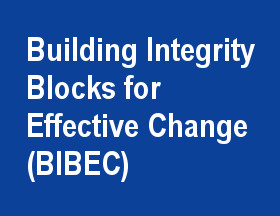Published: 01 October 2014
After successfully completing its Paribartan-Driving Change Project (PDC) which began in April 2009, Transparency International Bangladesh (TIB) today, 1 October 2014, embarks on a new five-year strategic phase labeled as Building Integrity Blocks for Effective Change (BIBEC). A consortium of development partners, consisting of UKAID (DFID), SIDA, SDC and DANIDA which financed the PDC project have come together again with a combined commitment of US 29.6 million to support BIBEC objectives.PDC’s learning clearly indicates that the “hardware” for anti-corruption infrastructure does exist in Bangladesh with necessary laws, policies and institutions in place. However, the “software” or practices and/or enforcement for practical changes are continuously failing the citizens’ expectations for good governed and a just society.Against this backdrop, the overall objective of BIBEC is to concentrate on building and strengthening a series of mutually supportive and reinforcing integrity blocks to effectively reduce corruption. “Blocks” here imply the key institutions, policy/law, education, training, ethics and values, and above all, the people of the country.The BIBEC project is fully consistent with key strategic priorities of the Government as enshrined in Article 11 of the Constitution, including , the Government of Bangladesh’s Perspective Plan 2010-21, Vision 2021, and 7th five-year plan which will be rolled out in 2016.BIBEC’s goal has been set to promote a more enabling environment for reducing corruption with twin objectives to advocate for reforms in laws, policies, processes, practices and oversight for improving governance in targeted institutions and sectors; and to generate peoples’ demand for good governance and to strengthen citizens’ capacity to challenge corruption. To achieve this goal, TIB will adopt three-pronged strategies: 1) conduct research to generate knowledge on corruption and necessary reforms in selected sectors and institutions; 2) advocate and communicate with stakeholders to catalyze change in conduct and practice and 3) build capacity of stakeholders for effective engagement against corruption. |
The first outcome of BIBEC project, when completed in 2019, will have strengthened institutional, legal and policy environment conducive to combating corruption. This will be made possible through enhancing anti-corruption knowledge of authorities/ institutions and developing partnerships/ network to strengthen anti-corruption movement.The second outcome will have improved transparency and accountability through citizens’ engagement in selected institutions/ selected sectors (health, education, local government, land, and climate finance governance). This will be achieved through strengthening information disclosure, dissemination and access in selected institutions; ensuring participation of citizens including climate change affected communities, women, marginalized and CSOs in local level planning, implementation and monitoring; engaging ordinary citizens, civil society and media to combating corruption both at local and national levels; and enhancing anti-corruption knowledge and developing capacity of stakeholders.The overall objective of BIBEC is to concentrate on building and strengthening a series of mutually supportive and reinforcing integrity blocks to effectively reduce corruption. “Blocks” here imply the key institutions, policy/law, education, training, ethics and values, and above all, the people of the countryIt may be mentioned here that since starting its operation in 1996, TIB achieved significant successes in terms of influencing the Government to undertake various anti-corruption reforms in the country. The major advocacy contributions included: a) enactment of the anti-corruption act 2004 and setting up of the Anti-Corruption Commission in 2004, b) Bangladesh’s accession to the United Nation’s Convention against Corruption (UNCAC) in 2007, c) inclusion of anti-corruption texts in the curriculum of secondary students in 2007; d) the enactment of the Right to Information act 2009 and e) and the enactment of the Whistleblower’s Protection act 2011. |
|
|








